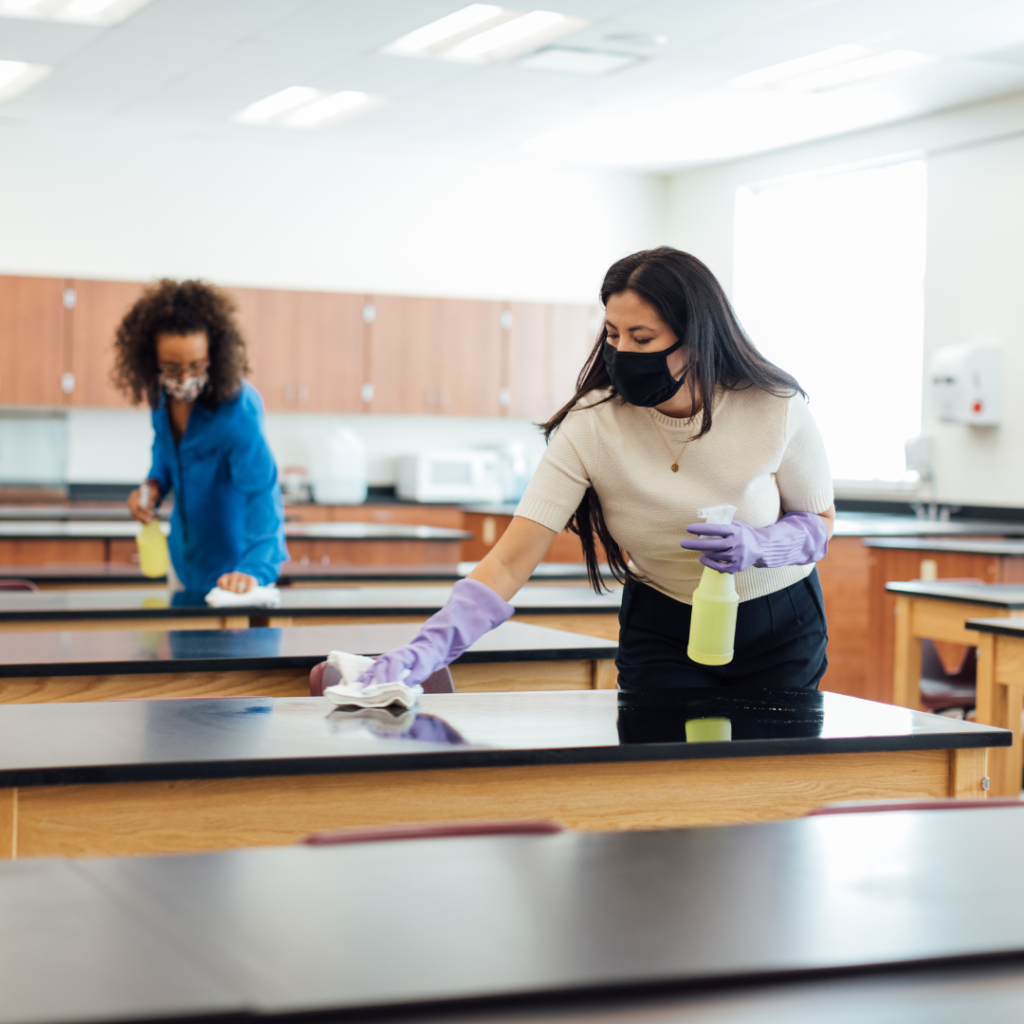Preventing Illnesses and Promoting Wellness
Maintaining health and hygiene in school environments is crucial for the well-being of students and staff. In Brussels, professional school cleaning services ensure that educational facilities are thoroughly cleaned and disinfected, reducing the spread of germs and viruses. Regular cleaning includes high-touch surfaces, floors, and restrooms, using eco-friendly products that are safe for children. By prioritizing cleanliness and hygiene, schools can create a healthier learning environment, minimizing absenteeism and promoting overall well-being. Investing in expert cleaning services helps maintain a safe and inviting atmosphere conducive to learning and growth.
Essential Cleaning Protocols for Schools
Effective school cleaning involves a comprehensive approach to maintain a hygienic environment. Essential protocols include daily tasks such as sweeping and mopping floors, disinfecting high-touch surfaces like desks and door handles, and replenishing soap and hand sanitizer stations. Weekly responsibilities often involve more intensive cleaning, such as scrubbing restrooms, dusting high surfaces, and checking for maintenance issues.
Monthly protocols might include deep cleaning carpets, inspecting air vents, and sanitizing less-frequented areas. By following these established cleaning routines, schools can prevent the accumulation of dirt and germs, thus ensuring a healthier environment for students and staff and minimizing the risk of illness and discomfort.

Impact of Professional Cleaning on Student Health
Professional cleaning services play a vital role in safeguarding student health by implementing rigorous sanitation practices. These services use specialized equipment and eco-friendly cleaning agents to effectively remove contaminants from surfaces, reducing the spread of infectious diseases. Studies have shown that schools with consistent, professional cleaning see lower rates of absenteeism due to illness, as fewer germs and allergens circulate.
- Rigorous Sanitation Practices: Professional cleaning services utilize specialized equipment and eco-friendly agents to thoroughly sanitize surfaces, effectively removing contaminants and reducing disease spread.
- Lower Absenteeism: Consistent professional cleaning has been linked to lower rates of student absenteeism, as fewer germs and allergens circulate within the school environment.
- Reduced Respiratory Issues: A clean environment helps minimize the incidence of respiratory problems and allergic reactions among students, promoting better health.
- Enhanced Health Outcomes: Investing in professional cleaning services supports overall student health, contributing to fewer illnesses and a more robust learning atmosphere.
- Improved Educational Experiences: By ensuring a safe and hygienic learning space, schools enhance students’ educational experiences and well-being, fostering a more productive and enjoyable learning environment.
Eco-Friendly Products for Safe School Environments
Utilizing eco-friendly cleaning products is crucial for maintaining a safe and healthy school environment. These products are designed to be effective against germs while minimizing exposure to harsh chemicals. They often feature biodegradable ingredients and are free from harmful toxins, making them safer for children and staff. By choosing eco-friendly options, schools can reduce the risk of allergic reactions and respiratory problems associated with traditional cleaning agents.
Moreover, these products often come from sustainable sources, aligning with broader environmental goals. Implementing such products not only contributes to a healthier indoor environment but also supports the school’s commitment to sustainability and the well-being of the school community.
Targeting High-Touch Surfaces
High-touch surfaces in schools, such as desks, door handles, and light switches, are prime locations for germs and bacteria to thrive. These areas come into frequent contact with hands, making them potential hotspots for the spread of illnesses. Regular and thorough cleaning of these surfaces is essential in preventing the transmission of viruses and bacteria among students and staff.
Disinfection protocols should focus on these high-contact points to ensure they are free from harmful microorganisms. By prioritizing the cleanliness of high-touch surfaces, schools can significantly reduce the likelihood of outbreaks and maintain a healthier learning environment, ultimately fostering better overall health and reducing absenteeism.
The Role of Regular Disinfection in Preventing Illness
Regular disinfection plays a critical role in preventing illness by effectively eliminating germs and viruses from frequently touched surfaces within schools. By applying antimicrobial agents on high-contact areas like desks, door handles, and restrooms, schools can significantly reduce the spread of infectious diseases. This routine practice is particularly vital during flu season or outbreaks, ensuring that pathogens are eradicated before they can spread. Consistent disinfection helps maintain a healthier environment, minimizing the risk of illness and promoting a safer learning space for students and staff.
Preventing Disease Spread
Routine disinfection is crucial for preventing the spread of contagious diseases in schools. By regularly treating high-touch surfaces with effective disinfectants, schools can significantly reduce the transmission of germs and viruses. This proactive approach ensures that common areas, such as desks and doorknobs, remain clean and less likely to harbor harmful pathogens.
Effective Antimicrobial Agents
Regular disinfection schedules utilize powerful antimicrobial agents designed to kill germs and viruses. These agents are specifically formulated to eliminate pathogens on surfaces and maintain a sanitary environment. By applying these products consistently, schools can ensure that areas frequently touched by students and staff are effectively sanitized, minimizing the risk of illness.
Critical During Outbreaks
Enhanced disinfection becomes especially important during flu season or when other illnesses are prevalent. Increased disinfection efforts help contain and reduce the spread of infections during these critical periods. Schools must intensify their cleaning protocols to address the heightened risk of contagion, ensuring that all surfaces are thoroughly disinfected and protected.
Beyond Basic Cleaning
Disinfection involves more than just regular cleaning; it requires the use of specialized products designed to eradicate pathogens. This process includes applying disinfectants that target specific germs and viruses, ensuring that surfaces are not only clean but also free from harmful microorganisms. Effective disinfection is essential for maintaining a truly hygienic environment.
Maintaining a Safer Environment
Consistent adherence to a disciplined disinfection routine helps schools maintain a safer environment for students and staff. By reducing the risk of illness through regular disinfection, schools promote a healthier atmosphere conducive to learning. This approach supports overall well-being, reduces absenteeism, and creates a more productive educational setting.
Creating a Germ-Free Learning Space
Achieving a germ-free learning space requires a multi-faceted approach that goes beyond routine cleaning. Effective strategies include improving ventilation systems to reduce airborne contaminants, implementing regular handwashing practices, and ensuring proper waste management. Schools can also enhance cleanliness by encouraging students and staff to follow good hygiene habits, such as covering coughs and sneezes and using hand sanitizer.
Additionally, maintaining clean carpets, desks, and common areas contributes to a germ-free environment. By integrating these practices with professional cleaning services, schools can create an environment that supports health and well-being, providing students with a cleaner, safer, and more productive place to learn and grow.
How Clean Schools Enhance Student Attendance
A clean school environment is closely linked to higher student attendance rates. When schools maintain high standards of cleanliness and hygiene, the risk of illness is significantly reduced. Fewer germs and bacteria mean fewer students fall sick, leading to lower absenteeism.
Cleaner schools not only help prevent the spread of illnesses but also contribute to a more pleasant and engaging learning atmosphere. Students are less likely to miss school due to health issues, which in turn supports better academic performance and overall engagement. By prioritizing cleanliness, schools create an environment where students can attend regularly, participate actively, and achieve their full potential.
Conclusion
In Brussels, maintaining health and hygiene in schools is paramount for the well-being of students and staff. Brussels Cleaning Services CSB ensures that educational facilities are meticulously cleaned and disinfected, utilizing effective antimicrobial agents to minimize the spread of germs and viruses. By adhering to rigorous disinfection routines, particularly during flu season or outbreaks, they help create a safer, healthier learning environment. For comprehensive school cleaning services that support a cleaner and more inviting atmosphere, contact Brussels Cleaning Services CSB at +32460202525. Your students’ health and safety are the top priorities.

